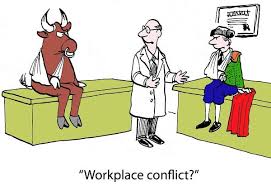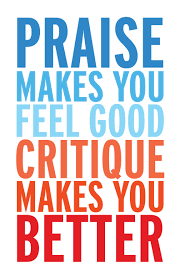Introduction
When you are surrounded by nice colleagues it will not be difficult to be amicable. And if those colleagues happen to be competent at work, collegiate and effective, cooperation is a piece of cake. Productivity will be on the rise. However, people are people and we all have our own personalities, our own  qualities, different ambitions and, unfortunately, imperfections. Thus conflicts in the workplace are inevitable.
qualities, different ambitions and, unfortunately, imperfections. Thus conflicts in the workplace are inevitable.
When problems arise
It becomes really problematic when one or more colleagues are simply annoying or worse: performing very poorly in what they call their work. For example, I once knew a secretary who saw work just like an annoying interruption of her personal love (read sex) life.
In this article, I am going to show you how conflict management could work.
And if it doesn’t in your case I will help you to a very good way out of the 9-5 job! Make money on the side, working from home. Check out my last paragraph!
In real life
Now it should be obvious that you expose annoying behavior or visible incompetence of a colleague, but doing so in an amicable conversation with words such as: ‘Say, colleague, just a point of attention; personally, I have a hard time when you arrive late at meetings and in those meetings you would miss out on the important things. You would do me a huge favor to do  something about it. ” A really collegiate answer would be: ‘Thanks for pointing this out to me. Now that I know what bothers you, I will take this into account and change for the better ‘.
something about it. ” A really collegiate answer would be: ‘Thanks for pointing this out to me. Now that I know what bothers you, I will take this into account and change for the better ‘.
Criticism not well received
But in reality, of course, that does not happen at all. Why? Because colleagues are bad at giving and receiving criticism and that is not without reason. If a colleague is considered to be (evidently) annoying, then the chance that he/she is open to criticism is extremely small. And it is precisely the prospect of a permanent conflict on the work floor that scares people to show something of dissatisfaction.
People hold back
It is quite a bit to accuse a colleague of incompetence, even though that allegation would be entirely justified. Of course, there is still the possibility of addressing one of the supervisors on the misconduct of a colleague. The problem is that such a step is experienced by most people as ‘snitching’ and the betrayal of a colleague is rejected as immoral.
You are better than them?
Another reason that keeps people from criticizing a colleague is that it feels like you are assuming a superior attitude; that with the criticism you raise yourself above the colleague. And that is exactly what people experience as non-collegiate. In the imagination, a guess is often made of what ‘a confrontation’ could bring about. The result of the imagined estimate is usually negative; in the sense that criticism given to a colleague would only worsen the relationship.
Consequence
And so it is possible that so many co-workers on a lot of work floors maneuver anxiously and cautiously past one another without speaking what is on their mind. The fear of a ruined work atmosphere is greater than the desire to call  the problematic colleague to order. But a work dispute with your supervisor or colleague can ruin the atmosphere on the work floor. In some cases, a conflict even leads to the resignation of one or both parties.
the problematic colleague to order. But a work dispute with your supervisor or colleague can ruin the atmosphere on the work floor. In some cases, a conflict even leads to the resignation of one or both parties.
Solving the conflicts
To me, this is a very unfortunate situation, that could be detrimental to people and the company alike. You certainly do not want this! So what can be done about this? Here is what you could do to solve the conflicts:
Step 1: Determine what is best to do
Are you really involved in the issue or not at all? To find out, write down for yourself why it is important and whether it is worth it to solve the problem. Bear in mind that sometimes it is easier to avoid the person or situation and just continue with your work, although ostrich policy is never a solution.
Come with solutions
In case the relationship with the person in question is important for the performance of your work or the achievement of results or just a nice working atmosphere, you will have to come up with a solution. Are you going to adapt yourself to the other person, are you going to negotiate or do you decide to work together on a solution?
Go over all the consequences of the different reactions and see where you benefit most from. The benefits need not only be expressed in money, but your feelings also play a great role.
Step 2: Invite them for a talk
When you choose to confront the opposing party, it is important that you do this in the right way. To increase the chances of a successful outcome, you should invite someone to a conversation at a specific location where you cannot be disturbed. By inviting someone, he/she gets the chance to prepare for what is to come. Why? Because an unexpected confrontation can generate unnecessary emotions and this generally leads to irrational reactions. Especially when you want to solve something that is not so convenient.
Time is of the essence
Do not wait too long with the invitation. It can be tempting to postpone a confrontation in the hope that it will disappear. Feelings increase significantly and delaying a response leads to more frustration and tension. This tension builds up more and more over time until at the next conflict all bets are off.
Remember that conflicts often do not arise because something has been said, but precisely because nothing has been said.
Step 3: Be objective
Start the conversation by describing the incident as objectively as possible. What happened? Where and when did it happen? What did the other person do and what did you do?
Do not make false assumptions and enter the conversation with an open attitude. You may have been misinformed or do not know the other side of the story. This is very important for your way to find a solution.
Step 4: Offer an apology
Only, and really only, if you are 100% sure that you did not do anything wrong, you can skip this step. But in general, there is always something to be found that you should not have said or done. Perhaps you have said something that  was mean in response to a certain statement or action.
was mean in response to a certain statement or action.
By apologizing in advance, you show that you want to find a solution and are open to negotiation. Please note that you only apologize for what you (might) have done wrong.
Step 5: praise the work of the other person
It can be very difficult to talk about the other person in a favorable way, but by doing so you take a big step in the right direction. Thank the person for his or her contribution to a project, the results or anything else he/she contributed to.
This step also serves as a test. Can you not think of anything positive about the other person? Then you may not be ready to resolve the conflict. In such a case it is advisable to call in a mediator.
Step 6: Discuss the consequences
Identify the negative consequences of the conflict. Think of consequences for you, the other party, the company, and the mutual relationship. Does the presence of the other person make you feel uncomfortable? Is a project delayed due to inadequate cooperation? Do you not dare to ask each other for help? Do you keep your information to yourself because you do not like the other person?
By discussing all the consequences of the conflict, you show why it is necessary to come to a solution. It also ensures that all those involved see the problem from a different perspective.
Step 7: Discuss the possible solutions
Try to find a solution that is as fair as possible by listening to each other’s suggestions. Sometimes both parties will have to make concessions, but in the end, it is always possible to come up with a suitable solution.
Then translate the solution to a goal so that you can both work towards it.
Step 8: Come with real actions
The conversation takes place to resolve a conflict. So come with concrete actions.
Depending on the conflict, you can come up with appropriate measures  together with the other person. Should the work be better distributed in the future? Do you have to belittle each other less? Or do you have to offer help more often?
together with the other person. Should the work be better distributed in the future? Do you have to belittle each other less? Or do you have to offer help more often?
Then plan a meeting in a couple of weeks so that you can evaluate the progress together. Is it going in the right direction? Is the problem solved? Or has it gotten out of hand and is mediation the only way to solve it?
Conflict or challenge?
Whatever the cause of the conflict, you should always act professionally. Avoid irrational decisions and follow the above step-by-step plan. Try to see each conflict as a challenge and think about an appropriate response. Show yourself from the best side and contribute to the solution. However, the step-by-step plan is no guarantee of success, because if the other person is not willing to cooperate, is just being an asshole, the conflict is unlikely to be resolved.
Trying is good
But even when it is not solved, you get satisfaction from the fact that you have tried it. You approached the problem with a positive mindset and made an attempt to arrive at a solution in a constructive way. In any case, it might then be better to start looking for alternatives.
Become an affiliate marketer
Get a job in another department (certain risks involved) or leave for another company ( not always easy) or what about this one: leave the corporate jungle and become your own boss. Nowadays, with the aid of the internet, everybody can have a shot at this and you can start while still having your job! Work from home and become an affiliate marketer.
Make money with your hobby and start today. Read here how to do it.


Hello,
I found this blog really interesting as Management training is part of my background, I was always having to persuade my boss that conflict management for our team managers was an essential part of training.
It does work and leads to better relationships in the workplace all round.
It took me a while to convince the directors too that my training and development skills would improve by attending a Mediation in the Workplace training course. Having a mediator helps to keep the conflict on an even keel, the argument/issues don’t get out of hand and difference can be settles amicably and professionally
So I am totally with you on this subject.
I like the layout of your website, it is clear and easy to navigate
You are touching a really good point in that managers should have mandatory training in conflict management. As you said this can prevent many festering issues between team members resulting in lower performance and output. All companies should be aware of these adverse effects. Once they realize that a chance of losing money is involved, they will generally react.
Jerry, you’ve put together a great article here about conflict resolution. It’s almost as if you are a psychic in the minds of many a worker out there.
I’ve been on both sides of the equation, if I’m honest, and I always appreciated when someone would reach out to let me know how they felt about something. I don’t want to be disliked, nor do I want to be worried about what others are quietly thinking about me. It’s refreshing to get the feedback and work on an amicable solution.
Having a separate meeting somewhere private is a good choice. I was taught in the Navy to praise in public but counsel in private. This saves unnecessary conflict when tensions might already be high.
Again, great article with actionable tips that should work in any environment.
Thanks Jerimy for your positive comments, which will contribute to my article. Your second paragraph perfectly describes the feelings of many people. If conflict management is done the right way, many long term issues will be avoided, amicability is at the forefront and the company’s productivity should increase.
Completely agree with the being objective sentiment. Too often people let their personal emotions interfere with work issues. A really helpful article, which will help me in many ways. Thank you for this.
Yes, it is mostly work issues that are in play here, although some people bring personal matters to the work floor. After all, we are all humans. People should be aware that there is a way out of conflicts at work, one way or the other.